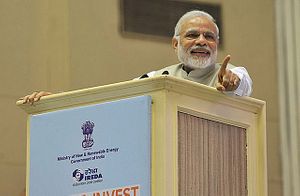As the world prepares for the crucial negotiations of COP 21 to be held in Paris this December, where an agreement is expected to replace the Kyoto Protocol with a new framework that limits the average global temperature rise to 2 degrees Celsius, India has been showing a renewed interest – and confidence – in leading the talks.
Earlier this year, Prime Minister Narendra Modi asked his diplomats to “shed old mindsets” and said India must take the lead in countering the challenge of climate change. Some three months later, India’s Chief Economic Advisor Arvind Subramanian gave a glimpse of India’s strategy for Paris and signaled a confident approach. It is interesting, therefore, to consider what kind of role India, a key player, is likely to have during the negotiations in Paris.
With a business-friendly government, India today is looking to begin writing an economic growth story that will enable it to lift millions of its citizens out of poverty. Achieving this aspiration will require high and sustained economic growth that is buttressed by a sound strategy for energy security. Unlike China or the East Asian Tigers, though, India will have to pursue economic development alongside significant commitments toward climate change action. But herein lies an opportunity, to choose a path of development that unlike the Chinese approach doesn’t have to be environmentally painful. India can save its population from the harmful effects of the unchecked exploitation of energy resources such as coal. Moreover, as India is home to some of the most vulnerable areas and people when it comes to climate change impacts, policies need not be seen as obligations alone, but as voluntary actions that will help save its people and environment. In the summer of 2015 alone, India has seen more than 1,800 deaths linked to heatwave conditions. Neighboring Pakistan also saw over 800 deaths due to a heatwave around the Sindh region. Reports have suggested that these conditions can be largely attributed to the effects of climate change. There were also reports that climate change stalled the monsoon this year. In recent years, these extreme weather conditions have become increasingly prevalent in South Asia and will only become more so unless strong climate measures are taken urgently.
In an article published by the Indian Express in May this year, Arvind Subramanian gave a backgrounder to India’s approach in Paris. He explained that the setback to climate change action that came in the form of a large decline in international energy prices could have been dealt with in a much better way had governments taken offsetting actions to impose taxes on petroleum products. India has done well on this front: It increased taxes while advanced countries preferred to pass on the benefits of price reductions to consumers and producers. Subramanian noted that India has taken a number of positive actions to combat climate change, which include increasing the excise duty on petrol and diesel, quadrupling the coal cess from Rs.50 per ton to Rs.200 per ton, and unveiling Modi’s ambitious plan to ramp up the production of solar energy from 20 Gigawatts currently to 100 GW by 2022.
It is encouraging from the Indian point of view that U.S. President Barack Obama during his meeting with the Indian prime minister in January agreed to help finance this planned $100 billion expansion of solar power in the next seven years. With its recent actions, India seems to be pushing hard to achieve its solar power objectives. Solar power projects are being encouraged and accelerated in a big way and the country is moving on track to become one of the largest solar markets in the world. Even Indian Railways is looking to chip in, starting trials of solar powered trains last month. It is also planning to come out with a solar policy for procuring 1000 MW solar power in the next five years.
India has also been aggressively looking to ramp up its nuclear power capacity. From operationalizing the Indo-U.S. nuclear agreement to striking nuclear cooperation pacts with countries like Russia, France, Canada and Australia, New Delhi seems to be taking steps to achieve its target of 14,600 MW nuclear capacity on line by 2020. Additionally, if India manages to accede to the Nuclear Suppliers Group, it would raise the bar for the country’s nuclear power capacity even higher.
In light of these government initiatives, India is poised to take a much more confident and dominant role in the climate change negotiations in December. India has set an example of newer types of climate change action that could be employed by other countries and that could also be included in the general global framework. For a successful meet in Paris, India, as one of the most important stakeholders, will clearly need to be in accord with the world’s advanced countries. For this to happen, all sides must reach out and help each other, quite literally, to combat the common challenge of climate change. The recent acknowledgements from the developed world of India as an important partner are welcome. There is a new vigor and willingness to partner India constructively in green initiatives such as the Global Apollo Programme – a plan to find ways within the next 10 years to make green energy clean cheaper to produce than energy drawn from coal, gas or oil. Such partnerships, technology transfers, and collaborations would go a long way in increasing the confidence and trust among the developed and developing world. That in turn will make it easier to find common ground for climate change action.
Kamal Madishetty is a postgraduate scholar at the Jindal School of International Affairs, Haryana and an alumnus of IIT Guwahati. The views expressed in this article are his own.
































